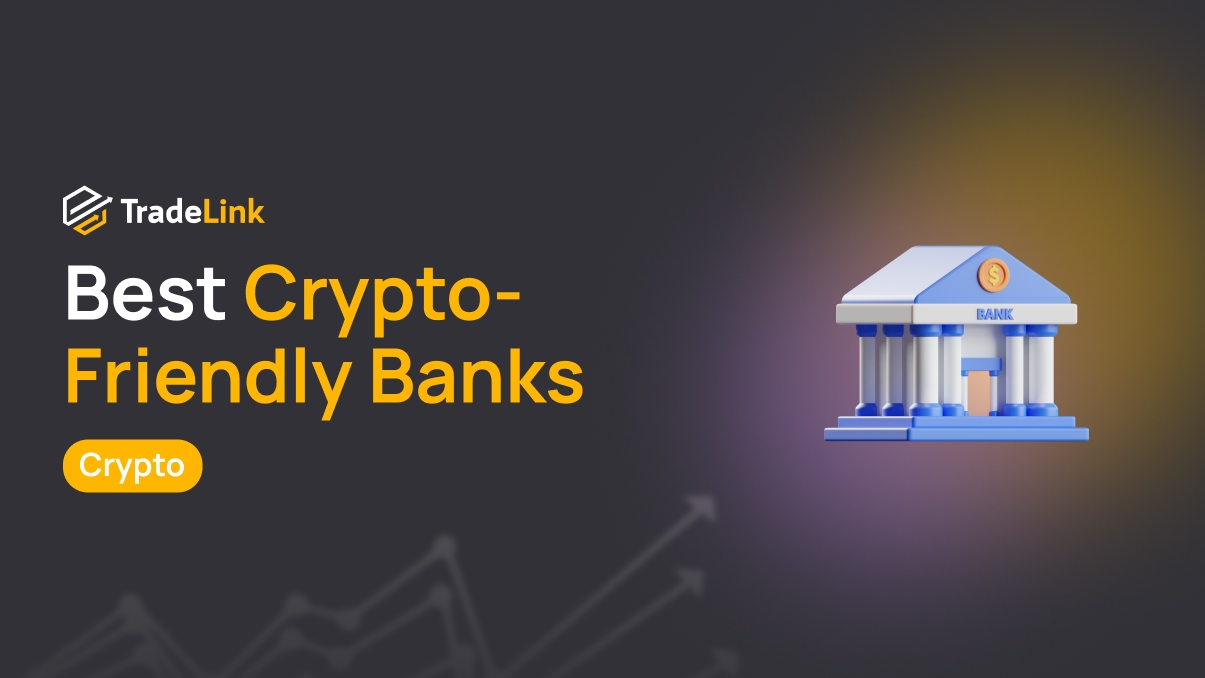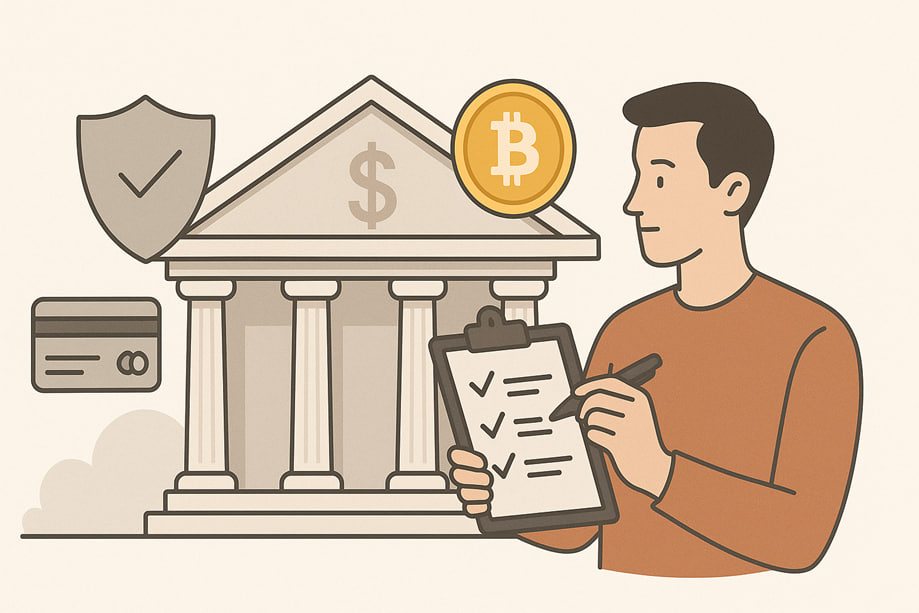Best Crypto-Friendly Banks: Where Traders Can Safely Work with Crypto

Contents
- Introduction
- Why Banks Are Important for Crypto Investors
- Criteria for Choosing a Bank for Working with Cryptocurrencies
- Top Crypto-Friendly Banks
- How to Start Working with a Crypto-Friendly Bank
- The Future of Banks and Cryptocurrencies
- Conclusion
Introduction
Cryptocurrencies are becoming increasingly popular. More and more people are buying, selling, and storing digital assets. However, conducting such operations is difficult without a good bank. Not every bank is willing to work with crypto. That’s why crypto investors increasingly seek banks supporting digital assets. These banks make it easier to manage money and avoid unnecessary complications. In this article, we will examine why it is essential to choose a crypto-friendly bank and what to pay attention to.
Why Banks Are Important for Crypto Investors

A bank is not just a place to store a salary or pay utility bills for a crypto investor. It is essential for key financial operations: depositing funds to crypto exchanges, withdrawing profits, currency conversion, and interacting with P2P platforms. Sometimes, a bank account stores part of the capital in fiat.
If a bank has a negative stance on crypto-related operations, there may be transfer blocks, payment rejections, or account freezes, especially for transfers to exchanges or other users. This creates inconvenience and risks.
On the other hand, a crypto-friendly bank understands the specifics of the crypto market and provides the client with the necessary flexibility. It does not obstruct legitimate operations, offers transparent conditions, and allows the use of banking infrastructure without excessive restrictions.
Problems with Traditional Banks
Some banks still treat cryptocurrencies with suspicion. If the word “crypto” appears in the payment reference, they may freeze an account without explanation or cancel a transfer.
Others impose high fees on international transfers, making it unprofitable to work with foreign exchanges. Sometimes, a bank may block a card if you send money via a P2P service, making it impossible to buy or sell crypto quickly.
Because of such restrictions, investors lose money and time. Unsurprisingly, more people are switching to banks that don’t put up roadblocks and are comfortable working with crypto.
Advantages of Crypto-Friendly Banks
Crypto-friendly banks strive to meet the needs of modern investors. They offer clear tariffs, reasonable fees, and support transfers to exchanges, without unnecessary bureaucracy, but within legal boundaries.
Such banks often allow seamless interaction with P2P platforms and other crypto services without causing problems when funding or withdrawing from an account. Some even issue cards that can be topped up from a crypto wallet, which is convenient for daily purchases.
Many of these banks collaborate with major exchanges, simplifying transactions and reducing the risk of blockages. Users save time and avoid unnecessary restrictions.
They don’t ignore security and don’t create artificial barriers, making them a convenient choice for those working with digital assets.
Criteria for Choosing a Bank for Working with Cryptocurrencies

Before opening an account, it is essential to assess whether the bank is suitable for working with cryptocurrencies. Don’t rely on luck—it’s better to determine how it handles operations related to exchanges in advance.
The most reliable method is to study the terms on the bank’s website and clarify everything directly with customer support. You should ask: Are transfers to crypto exchanges allowed? Are incoming payments from them supported? What is the bank’s stance on working with P2P platforms? Some banks block such operations or require additional verification.
You must also carefully examine fees, especially for international transfers and currency conversion. These costs can significantly reduce profits, particularly with frequent transactions.
It’s essential to consider geographical service availability: not all banks serve clients from other countries, and transfers to foreign companies in some jurisdictions may be restricted.
Before choosing a bank, ensure its reliability: the presence of a license, transparent terms, and a responsive support service. Reputation also matters—if reviews frequently mention account freezes and refund problems, it’s better to look for an alternative.
Additional benefits may include specialized products for crypto investors, such as bank cards that can be topped up from a crypto wallet, exchange integrations, convenient API access, or support for automated payments.
What Services Crypto Banks Offer
Crypto-friendly banks offer a range of functions that make working with digital assets more convenient. For example, some allow users to exchange cryptocurrencies for fiat and vice versa via the banking interface or partner services. The terms and speed of such operations depend on the specific bank and its integrations, so checking details in advance is important.
Debit cards that can be funded through a crypto wallet are also popular. This allows you to use cryptocurrency for everyday purchases without having to convert funds each time manually.
Some banks offer digital asset custody services, including wallets with enhanced protection. Integrating crypto exchanges simplifies funding and withdrawing without hassle or third-party services.
Advanced tools are available for more active users: data export, API support, and automatic report generation. These tools help simplify working with cryptocurrencies and establish proper accounting.
Top Crypto-Friendly Banks

Examples of banks that work with cryptocurrencies
As of 2025, there are banks worldwide that support working with digital assets in some form or another. It’s important to remember that terms can change, and cooperation with crypto platforms doesn’t mean a complete absence of restrictions. Always verify information directly on the bank’s website or through support.
- Revolut (UK / EU)
One of the most popular fintech services allows users to buy and sell cryptocurrencies directly in the mobile app. It works with Bitcoin, Ethereum, and other top assets. The platform supports storage, though crypto withdrawals are not available in all regions. Fees depend on the account type (standard, premium, etc.).
- SEBA Bank (Switzerland)
A licensed Swiss bank focused on digital assets. Serves institutional and private clients. Offers custody, management, and trading services for cryptocurrencies—a regulated entity with high compliance.
- Bank Frick (Liechtenstein)
It specialises in blockchain projects and fintech companies. It offers custodial services (crypto asset storage) and the ability to invest in crypto assets through securities instruments. Its primary focus is on institutional clients in the EU.
- DBS Bank (Singapore)
One of the largest banks in Asia has created its own digital asset platform, DBS Digital Exchange. Primarily aimed at corporate clients and qualified investors, it provides custody and trading services, but access is limited geographically and by client status.
- T-Bank (Russia)
T-Bank (formerly Tinkoff) does not work directly with cryptocurrencies, but its clients sometimes use regular bank transfers or cards to fund P2P platforms. However, such operations may be restricted—the bank may block a transfer or request explanations. Because of this, investors often seek more crypto-friendly alternatives.
Bank Conditions Comparison
Bank | Region | Fees | Cryptocurrency Support | Interface Convenience |
Revolut | EU/UK | Low | BTC, ETH, LTC, etc. | High |
Silvergate | USA | Medium | Yes, including institutional | Medium |
Bank Frick | Europe | Medium | Yes | Medium |
SEBA Bank | Switzerland | Medium | Yes | High |
DBS Bank | Asia | Medium | Yes | Medium |
Studying each option and determining which one suits your individual goals is essential.
How to Start Working with a Crypto-Friendly Bank

To take advantage of a crypto-friendly bank, you need to go through several key steps:
-
Choosing the Right Bank
It’s essential to verify in advance whether the bank supports transfers to and from crypto exchanges, allows operations with P2P platforms, and how it handles crypto-related transactions. Check terms on the official website and confirm details with customer support. -
Opening an Account
Most banks allow applications to be submitted online, via the website or mobile app. Usually, you’ll need to provide basic information: name, nationality, contact details, and the purpose of opening the account. -
Passing KYC Verification To access financial services, the bank must identify the client. Verification includes:
-
Uploading a passport or other ID
-
Proof of residence (e.g., utility bill)
-
Sometimes — a selfie with the document
-
Setting Up Transfers
Once the account is opened, you can begin setting up transfers. First, ensure the chosen exchange accepts payments from this bank, and carefully enter all payment details. If using P2P services, check if transfers to personal accounts are allowed. -
Exchange Integration (if available)
Some banks or fintech platforms allow linking a bank account to a crypto exchange via API. This is especially useful for active traders and companies using automated tools.
Security Tips
Security is key when working with cryptocurrencies and the banks that support them. To minimize risks, follow a few fundamental principles:
-
Use Only Licensed Banks
Before opening an account, make sure the bank holds a valid license. This can be verified on the national financial regulator’s website or official registers. Licensed banks are subject to anti-fraud requirements and must provide a basic level of client fund protection. -
Check the Bank’s Reputation and Policy
It is also essential to determine whether the bank works with well-known crypto exchanges and its attitude toward crypto transactions. If the bank frequently blocks transfers to exchanges or P2P platforms, it can create problems later. -
Two-Factor Authentication (2FA)
Using 2FA is a must for protecting account access and performing transactions. The most secure option is to use a separate app (e.g., Google Authenticator or Authy), not SMS codes, which are vulnerable to interception. -
Store Assets Outside of Banking Systems
For storing large amounts of crypto, it is recommended to use cold wallets —devices or software not connected to the internet. Banks are convenient for operational activities, but asset control should remain with the user. -
Phishing and Digital Hygiene
Do not click suspicious links, enter banking information on untrusted sites, or share confirmation codes with third parties. Even with strong bank security, compromises usually occur due to user actions.
The Future of Banks and Cryptocurrencies
Banks’ approach to cryptocurrencies is gradually evolving. More traditional financial institutions are exploring the potential of blockchain technology—for example, to improve settlement transparency, speed up clearing, and automate internal reporting. A significant area is the development of Central Bank Digital Currencies (CBDCs). These projects allow governments to issue digital versions of fiat while maintaining complete control over issuance and regulatory compliance. In some countries, CBDCs are already being tested or rolled out in a limited scope.
At the same time, the number of fintech companies and neobanks initially oriented toward digital assets is growing. These platforms often offer crypto wallet integration, exchange support, and more flexible service terms. However, most operate under payment operator licenses, not as fully-fledged banks.
Regulatory frameworks are also developing. Various countries are introducing new rules regarding KYC/AML checks, reporting, and interaction with crypto services. This forms a legal foundation for cooperation between banks and the crypto industry while increasing user protection.
Thus, crypto-friendly banks are becoming a full-fledged element of financial infrastructure. However, their openness to digital assets still depends on specific jurisdictions and regulatory stances.
Conclusion
Working with cryptocurrencies requires infrastructure that doesn’t create unnecessary obstacles. A crypto-friendly bank can be a reliable tool for transferring funds, withdrawing profits, and integrating with exchanges, provided it meets security requirements and genuinely supports digital assets.
This article has covered key criteria for choosing a bank, possible limitations, examples of existing platforms, and steps to get started.
Before deciding, it is essential to independently study the terms, fees, legal status, and available features. Questions of financial security and compatibility with crypto services are not marketing slogans—they are the foundation of stable and lawful digital asset operations.
Choosing the right bank is an investment in the resilience and reliability of your entire cryptocurrency infrastructure.